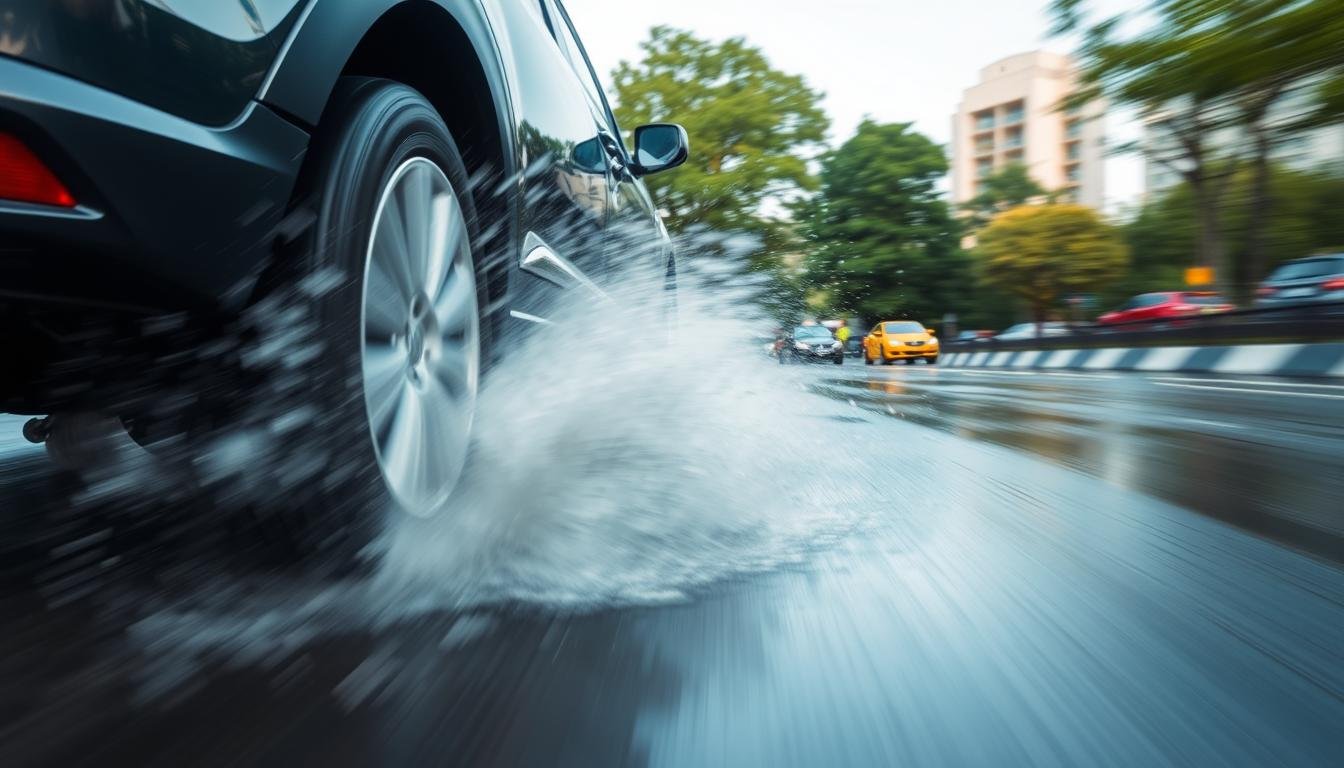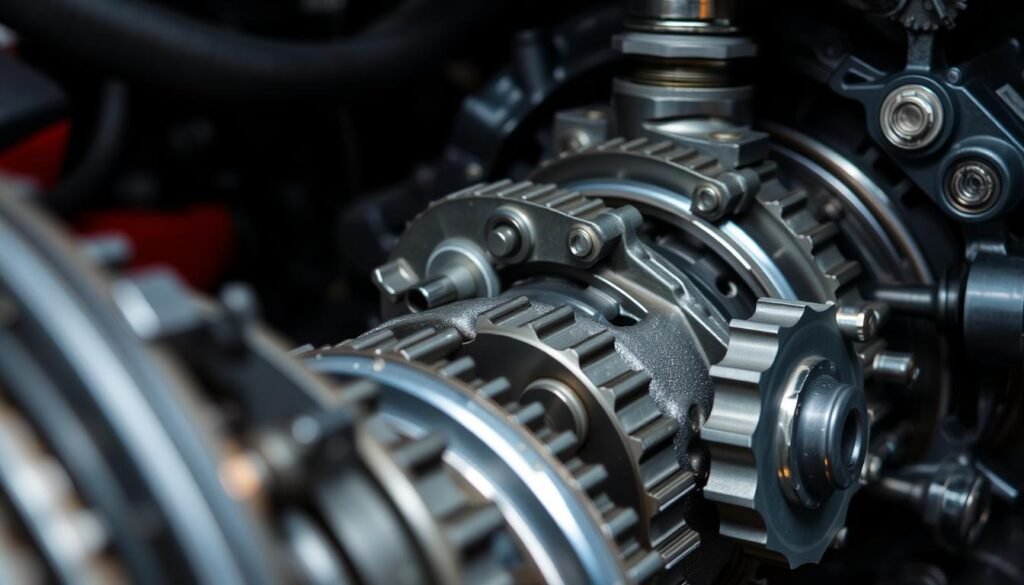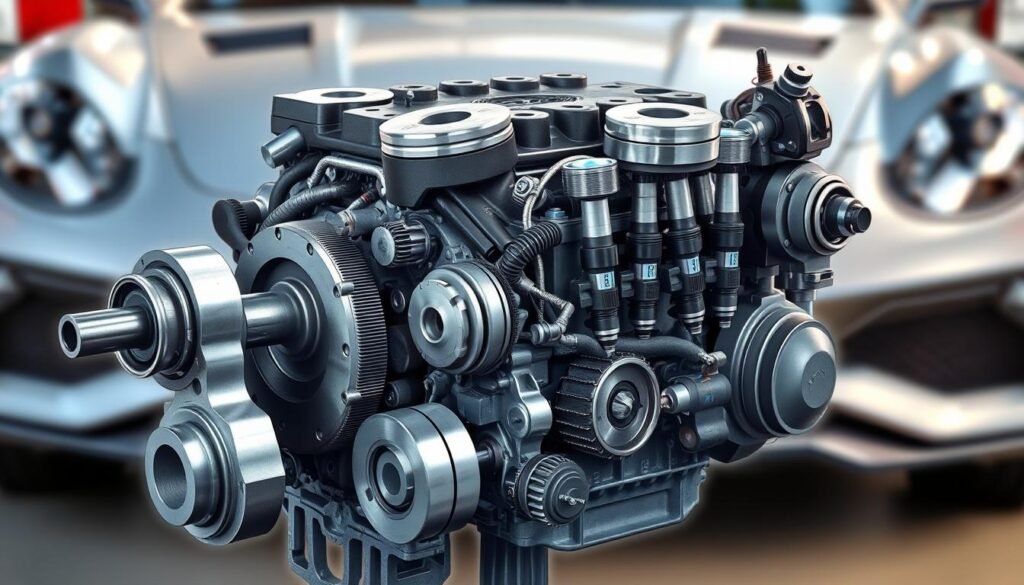Ever felt your car jerk or shudder when you hit the brakes? This problem can be scary and even dangerous if you don’t fix it. But what makes your car jerk, and how can you stop it? Why does my car jerk when slowing down? Let’s explore the reasons and solutions together.
Key Takeaways
- Worn brake pads, warped brake rotors, and faulty brake calipers can lead to jerking when braking1.
- Transmission problems such as slipping gears or delayed downshifting can also contribute to jerking during braking and deceleration1.
- Engine-related issues, including misfires and throttle control problems, can cause jerking when slowing down1.
- Replacing worn brake pads can cost around $150-$300 per axle, while replacing brake rotors typically ranges from $150-$200 per rotor2.
- Resolving transmission issues can range from $100 for minor adjustments to $3,000 for a new transmission2.
Understanding Car Jerking: What You Need to Know
Car jerking can be unsettling for drivers. It shows up as sudden jolts, vibrations, or odd movements when slowing down. Knowing the signs, when to worry, and the safety risks are key to fixing this problem.
Common Signs and Symptoms
Signs of car jerking include jerks when braking, engine issues, and strange noises. Worn spark plugs can make the engine misfire3. Dirty fuel injectors also cause misfires3. Damaged acceleration cables lead to jerking when speeding up3. Blocked fuel or air intakes mess up the engine’s burning process3.
When to Be Concerned
If jerking doesn’t stop or gets worse, it’s a big worry. It might mean serious problems like transmission or brake issues. Pay attention to any changes in jerking. It could mean you need to fix it fast.
Safety Implications
Car jerking can be dangerous. It can make driving harder, increase stopping times, and cause accidents. Moisture in the distributor cap can cause engine misfiring3. A clogged catalytic converter makes the car jerk or stutter when you press the gas3. Fixing these problems quickly is vital for safe driving.
Understanding signs, knowing when to worry, and being aware of safety risks are important. By fixing the root causes, drivers can improve their driving and stay safe on the road.
Why Does My Car Jerk When Slowing Down
Many things can make a car jerk when slowing down. One big reason is transmission problems, like slipping gears or slow downshifting4. For example, the 2003 Acura MDX had issues with its transmission. It made a loud ping sound when shifting to D3 and had a hard downshift to first gear at 1,000 RPMs4.
Brake system issues can also cause jerking. Worn brake pads5 or warped brake rotors5 can cause uneven pressure. This leads to vibrations and jerking. Replacing front or rear brake pads costs between $100 to $300. If both need replacing, it’s double the cost6.
Other reasons include engine misfires from bad spark plugs or ignition coils. Also, fuel delivery problems can cause jerking. Issues like a malfunctioning throttle position sensor, vacuum leaks, or problems with the idle air control valve can also cause this problem.
Finding out why your car jerks requires checking many parts. If you ignore it, you risk safety and more costly repairs5. Fixing the problem quickly keeps your car safe and running well5.
| Potential Cause | Symptoms | Estimated Repair Cost |
|---|---|---|
| Transmission Problems | Slipping gears, delayed downshifting, loud pinging sounds | Variable, depending on the extent of the issue |
| Brake System Issues | Uneven brake pad wear, warped rotors, sticking calipers | $100 – $300 per axle for brake pads, $30 – $75 per rotor |
| Engine Misfires | Rough idling, decreased engine performance | Varies depending on the specific problem |
| Fuel Delivery Problems | Inconsistent acceleration, stalling, poor fuel efficiency | Varies depending on the specific problem |
“Ignoring signs of jerking during braking can lead to safety risks and more expensive repairs. Immediate addressing of brake problems substantially reduces the risk of accidents.”5
Transmission and Brake-Related Issues
Car jerking when slowing down often points to transmission or brake problems. Knowing the common issues and maintenance needs is key to fixing the problem.
Transmission Problems and Solutions
Transmission issues can cause car jerking during braking. Low transmission fluid levels7, worn clutches, or a faulty torque converter are common culprits. To fix it, you might need to replace the fluid, repair the transmission, or even rebuild it, depending on the problem’s severity.
Brake System Components
Brake problems can also cause jerking when slowing down. Worn brake pads5, warped rotors5, faulty calipers5, and dirty brake fluid can lead to uneven pressure. This uneven pressure causes vibrations or jerking. Regularly checking your brake parts and fixing any problems quickly is vital for smooth braking.
Maintenance Requirements
Following your car’s maintenance schedule is key to avoiding transmission and brake issues. This includes replacing brake pads5, checking and topping off brake fluid levels5, and keeping the transmission fluid at the right level7. Ignoring these tasks can cause bigger mechanical failures and raise the risk of accidents due to poor braking5.
If your car jerks when slowing down and it won’t stop, get it checked by a mechanic. They can find the problem, whether it’s in the transmission, brakes, or elsewhere. They’ll fix it to make your car brake smoothly and reliably75.
Engine and Fuel System Problems
If your car jerks when slowing down, it might be due to engine or fuel system issues8. Engine misfires can happen if spark plugs are worn out, ignition coils are faulty, or fuel delivery is off8. This can make your engine perform irregularly and jerk.
Clogged fuel injectors also cause problems. They lead to uneven fuel delivery, making your car feel jerky.
Bad sensors, like the mass airflow or oxygen sensor, can mess up the air-fuel mix8. This can make your engine jerk. Vacuum leaks in the intake system can also cause issues, leading to jerky driving8.
To fix these problems, you might need to replace parts or repair systems8910. Regular maintenance and quick troubleshooting can help avoid these issues. This keeps your car running smoothly, even when slowing down.
“Addressing engine and fuel system problems can be crucial in resolving car jerking issues and ensuring a safe, smooth driving experience.”
Preventive Maintenance and Troubleshooting Steps
Keeping your car in top shape is vital to avoid jerking when slowing down. Stick to the regular vehicle maintenance schedule set by the manufacturer. This includes regular fluid changes, replacing parts, and checking systems thoroughly11.
Regular Maintenance Schedule
Don’t skip routine tasks like oil changes, tire rotations, and brake checks. Skipping these can cause bigger problems later. Also, pay attention to any unusual sounds or performance drops to catch issues early12.
DIY Inspection Tips
- Check fluid levels, including engine oil, transmission fluid, and brake fluid, and top them up if needed.
- Inspect brake components like pads, rotors, and calipers for any signs of wear or damage.
- Listen for unusual sounds, such as grinding, whining, or squeaking, which could indicate a problem.
When to Seek Professional Help
While some DIY troubleshooting is helpful, some issues need a professional diagnostics service. Problems with the transmission, engine management system, or wheel alignment are best left to experts12. Trying to fix these complex systems yourself could cause more damage and expensive repairs.
“Regular maintenance and prompt attention to any warning signs are essential for avoiding car jerking and ensuring a smooth, safe driving experience.”
| Maintenance Task | Recommended Interval |
|---|---|
| Oil Change | Every 3,000-5,000 miles |
| Tire Rotation | Every 5,000-8,000 miles |
| Brake Inspection | Every 6 months or 6,000 miles |
| Transmission Fluid Flush | Every 30,000-60,000 miles |
Conclusion
Fixing car jerking when slowing down is key for a smooth ride13. It keeps your car running well14 and keeps you safe13. Knowing why it happens, like bad transmission or faulty sensors13, helps you fix it.
Regular checks and quick fixes stop bigger problems14. Fixing low fluid or worn parts14 makes your car better. If unsure, a mechanic can help right away.
Keeping up with maintenance and DIY checks helps a lot13. If needed, get professional help. This way, you’ll drive smoothly, safely, and worry-free.
FAQ
What are the common causes of a car jerking when slowing down?
A car jerking when slowing down can be due to several reasons. These include problems with the transmission and brakes. It can also be caused by engine misfires, worn-out suspension parts, and low transmission fluid. Additionally, ABS malfunctions and fuel delivery issues can lead to this problem.
What are the typical signs and symptoms of a car jerking when slowing down?
Signs of a car jerking when slowing down include sudden jolts and vibrations. You might also notice irregular movements when decelerating. Other symptoms include jerking sensations when braking, inconsistent engine performance, and unusual noises.
When should I be concerned about my car jerking when slowing down?
If your car jerks when slowing down and it doesn’t stop, you should be worried. This could mean serious mechanical problems. Such jerking can make it harder to control your vehicle, increase stopping distances, and be unsafe.
How can transmission and brake-related issues cause a car to jerk when slowing down?
Transmission problems like low fluid levels, worn clutches, or faulty torque converters can cause jerking. Brake system issues, such as worn brake pads, warped rotors, or faulty calipers, can also lead to jerking.
What engine and fuel system problems can lead to a jerking car when slowing down?
Engine misfires due to worn spark plugs, faulty ignition coils, or fuel delivery issues can cause jerking. Problems like clogged injectors can also disrupt the engine’s performance. Faulty sensors and vacuum leaks can affect the air-fuel mixture, leading to jerky engine performance.
How can I prevent car jerking when slowing down?
To prevent car jerking, regular maintenance is key. Follow the manufacturer’s service schedule and check fluid levels. Inspect brake components and address any wheel alignment problems. These steps can help avoid jerking issues.
When should I seek professional help for a car jerking problem?
If you’re dealing with complex issues like transmission or engine management problems, seek professional help. A qualified mechanic can diagnose and fix these problems. It’s best to consult a mechanic if you’re unsure of the cause or can’t fix it yourself.



[…] Sai Li Fuel System’s heart is its fuel injectors. They spray fuel precisely, leading to better combustion. This means your engine performs better, […]